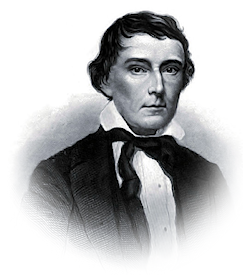The people are misled, and will see their course I fear when it is too late.
Alexander H. Stephens to J. Henly Smith.
Crawfordville [Ga.], Dec. 31st, 1860.
Dear Smith, Yours of the 26th inst. was received last night. I do not think anything can be made of any of the propositions I have seen submitted for the settlement of our existing national troubles. Mr. Douglas sent me his. I got it a few days ago and wrote to him forthwith by return mail that I did not think his terms would ever be agreed to by the South. His first and second would never be agreed to—the one looking to the colonization of the blacks would never—nothing can be made of any such scheme of adjustment. I do not think that we stand in need of any new constitutional guarantees—we may hereafter if the Union should last—but at present we do not. All we now want or ought to want is a faithful administration of the gov[ernme]nt, under the present constitution with all its present obligations and guarantees. All that the South has at present just cause to complain of, and the chief ground of just complaints, is the personal liberty bill[s] of some of the non-slaveholding states. These ought to be repealed, and I doubt not if the whole South had united in asking their repeal with firmness and decision and with an honest intent to be satisfied with it when they got it that success would have crowned their efforts. Of this I am satisfied. But the truth is our ultra men do not desire any redress of these grievances. They would really obstruct indirectly any effort to that end. They are for breaking up. They are tired of the gov[ernme]nt. They have played out, dried up, and want something new. Here was all the danger or the great difficulty in the way of making any settlement or adjustment. It seems to me at present insurmountable! I do not see how it can be removed or gotten over. Our difficulties spring not from the gov[ernme]nt, its frame work or its administration so much as they do from the people, the leaders mainly. I have for now two years been impressed with the conviction that we are approaching “the beginning of the end” of this great republic. The events at Charleston and Baltimore but increased this conviction. They disclosed that distemper in the times that I had before seen showing its symptoms. All is now dark and gloomy. I see no ray of hope. What is to become of us I know not. I have but one guiding principle, let come what may, and that is to do my duty as I understand it. Our election comes off day after tomorrow. It will be over before you get this. I now feel almost confident that this State will go for secession. I think it unwise and have done what I could to prevent it; but it is beyond my control, and the movement will before it ends I fear be beyond the control of those who started it. I saw and noticed the articles you mentioned in the Star of the South. I thought as you did about the authorship of them both. I cared nothing for either. The historical illustrations brought forward to [meet?] me were exceedingly unfortunate. Hampden, Pym and Hollis were the leading spirits of the Revolution in England beginning in 1640—Hampden fell in battle, Pym died before the war ended, Hollis alone of the three lived to survive it. He was swept away by the current and was one amongst the first to go for a Restoration of the Monarchy under Charles II without one word of guarantee against the prerogative of the Crown which was the cause of the Revolution. Cromwell had nothing to do with [the] first movement as an active agent. He was unknown. He was a child of the Revolution, grasped all honour and ruled England with more rigour than any king ever did before or since. This he did in the name of Liberty. Nor did Louis Napoleon have anything to do with the French Revolution in 1848 in which Louis Philippe was dethroned. That was commenced by Lamartine and a few other patriots. Louis Napoleon sprang up afterwards. He overthrew the Republic and put himself at the head of an Empire with more despotic power than Louis Philippe ever undertook to exercise. But I cannot dwell on these things. The times are distempered. The people are misled, and will see their course I fear when it is too late. What I say to you is not for any one else—except this, that I have no idea of going to Washington. My health will not permit me even if I wished to go. But I see no prospect of doing any good there and very little here or anywhere. Mr. Buchanan has ruined the country. It is past praying for I fear. His appeal to Heaven was made too late.
From Annual Report of the American Historical Association for the Year 1911.
Alexander Hamilton Stephens was an American politician who served as the vice president of the Confederate States from 1861 to 1865. After serving in both houses of the Georgia General Assembly, he won election to Congress, taking his seat in 1843. After the Civil War, he returned to Congress in 1873, serving to 1882 when he was elected as the 50th Governor of Georgia, serving there from late 1882 until his death in 1883.
J. Henley Smith was a Georgia journalist.
